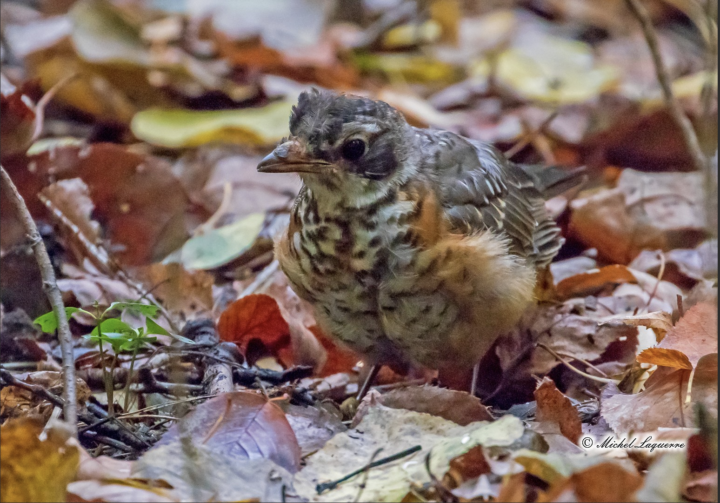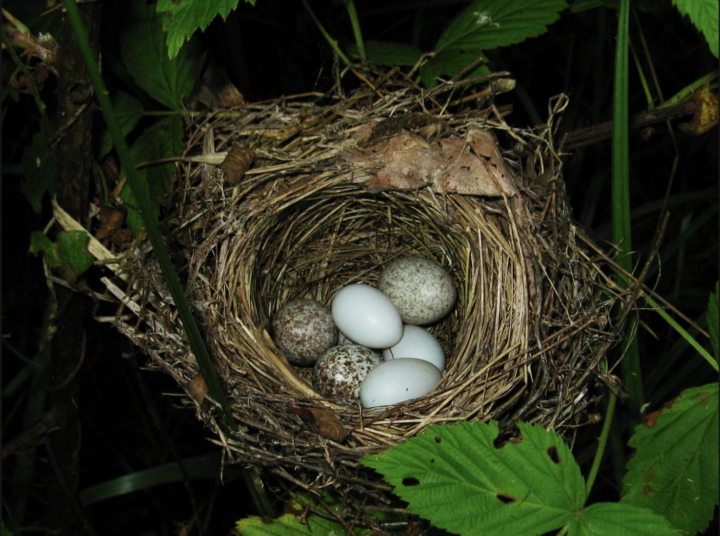“I’m Bringing Home a Baby Bird!”

American Robin | Turdus migratorius 📸Michel Laquerre / Macaulay Library at the Cornell Lab (ML182169741)
If you teach kids, at some point it is likely that one of those students will ask you what they can do for a baby bird that’s lying helpless outside of its nest. Even worse, they might even walk up to you with the chick or unhatched egg in their hand. Students will likely have questions and misconceptions about baby birds and they want to know “the truth” from you. Knowing the facts about what is truly helpful for baby birds (and what isn’t) will help you handle these situations and offer teachable moments!
Baby bird FAQs to share with family, friends, and students:
Q: I found a baby bird on the ground, should I take it in and feed it?
A: When most people see a baby bird lying on the ground, their first instinct is to “rescue” it, take it in, and attempt to raise it. They may not realize it, but many of these baby birds are perfectly healthy fledglings that do not need help at all! Fledglings are usually fluffy and able to hop around and tightly grip your finger or a twig. If the bird you find fits this description, it is completely normal for them to be hanging out on the ground and should be left alone.
However, in some cases, younger baby birds, called nestlings, fall out of the nest before they are ready to leave. Nestlings usually have very few sparse feathers and cannot hop around or grab on to a twig. In this case, the nest is definitely close by and you should delicately place the nestling back in it. As long as the nestling is not injured, it should be fine once it is place back in the nest.
Under any circumstances, baby birds should not be fed things such as milk or bread.
Q: If I handle a baby bird, won’t its parents pick up my scent and abandon it?
A: Luckily, that’s just a myth. Parent birds don’t recognize their young by scent; most birds don’t even have a good sense of smell.
Q: Why do birds leave the nest before they can fly?
A: Typically, it is advantageous for the baby birds to leave as soon as they can. A nest full of squawking baby birds can easily attract predators, and nest can host parasites. Parent birds work quite hard to get their young out of the nest as soon as possible.
Q: I accidentally spooked a nesting mother. She flew away and hasn’t returned. Should I try to hatch the eggs myself?
A: In addition to being illegal to posses bird eggs from birds protected by the Migratory Bird Treaty Act, hatching eggs is a very delicate and intense process! Incubating and hatching chicks takes a lot of experience, time, and equipment and is also nearly impossible. Additionally, if you try to hatch them yourself, the hatchlings might have grave deformities, even if they survive at all. For these reasons, many wildlife rehabilitation and nature centers don’t even try to hatch eggs, so you should check to see about this before bringing eggs to potential helpers.
Luckily, mother birds usually return to the nest eventually, but it might take a little while. They have a lot invested in their eggs and are very unlikely to just abandon them altogether.
Notes about “nests” in classrooms:

Brown-headed Cowbird | Molothrus ater 📸 Chris Barrigar, Macaulay Library at the Cornell Lab (ML137611731)
Teachers often hope to use nests that are old or abandoned for teaching or classroom use. However, possessing the nest of a migratory bird is not legal without the proper permits, according to the Migratory Bird Treaty Act. It is best to just leave nests in nature, where they belong. Who knows, a migrating bird will most likely use the nest again next year!
However, there is some good news: you and your students can observe nesting birds and behavior without leaving the classroom! During nesting season, you can livestream video from our high-definition “Bird Cams” and use our accompanying Life in a Nest activity series to teach about birds and nesting behavior. Also, the June lesson of our Feathered Friends lesson series focuses on nesting birds and learning about nesting behavior using real life examples seen through the Nest Cams!
Want to know more?
For more information on baby birds, sick and injured birds, migrating birds, and more, check out the All About Birds FAQ page. This page is full of great information to share with your student so that they know how to make decisions that are good for birds!